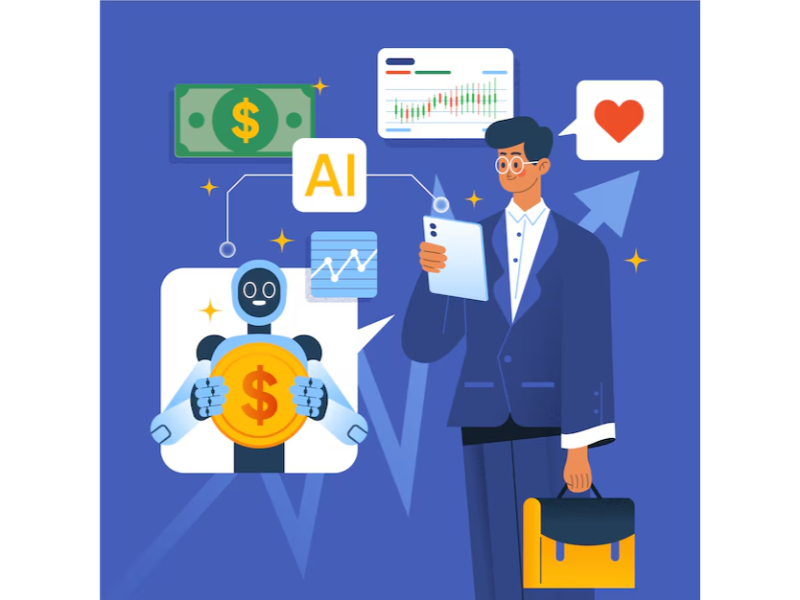- Artificial intelligence is transforming the financial services sector, enhancing risk assessment, customer service, and credit scoring, offering both disruption and opportunities for traditional banks and smaller fintech firms
- AI is enabling smaller fintech companies to compete with larger banks by providing personalized financial services, allowing them to offer tailored solutions that rival those of established financial institutions
At the 2024 Money20/20 conference in Las Vegas, NVIDIA unveiled a revolutionary AI vision for the financial sector that could redefine the future of banking. Amidst the excitement surrounding generative AI and its impact on industries worldwide, NVIDIA’s CEO, Jensen Huang, took to the stage with a bold declaration: “AI will be the most significant transformation in financial services since the advent of the internet.”
Huang’s remarks were more than just hype. NVIDIA’s latest AI innovations, from accelerated data processing to real-time predictive analytics, aim to enhance everything from fraud detection to personalized customer service in finance. One key demonstration was an AI-driven platform designed to optimize risk management for banks, enabling them to predict and mitigate potential financial crises before they occur.
The unveiling wasn’t just a showcase of cutting-edge technology—it represented a turning point in the ongoing conversation about AI’s role in the future of finance. As traditional financial institutions continue to grapple with the digital transformation, NVIDIA’s vision presents both a challenge and an opportunity. Could AI disrupt the banking industry as we know it, or will it simply enhance the systems already in place?
 Nvidia
NvidiaThis feature will explore the dual nature of AI in fintech, with a unique focus on how it enables smaller financial institutions to compete against established giants through innovation in intelligent financial advisors and personalized services.
Also read: What is the difference between fintech and blockchain?
Also read: Schneider and Nvidia: Transforming AI data center cooling system
AI in risk assessment and credit scoring

Risk assessment and credit scoring are two critical areas where AI is making a transformative impact on the financial services industry. Risk assessment refers to the process of evaluating the likelihood that a borrower will default on a loan or credit obligation. Traditional risk assessment methods often rely on historical financial data, such as credit scores and income levels, but these models can fail to capture a complete picture of a borrower’s ability to repay. Credit scoring is an established system that assigns a numerical value to a borrower’s creditworthiness based on factors such as past borrowing behavior, repayment history, and current financial obligations.
In the past, both risk assessment and credit scoring primarily utilized data such as credit histories and income, which could exclude those with limited financial records or non-traditional backgrounds. This led to what is known as credit invisibility, where many people—especially in underserved communities—could not access credit simply because they lacked sufficient or conventional credit histories.
AI is rapidly changing this dynamic. By leveraging vast amounts of data, including alternative sources like social media activity, utility bill payments, and even transactional behavior, AI-based models can assess risk with a level of precision and inclusivity previously unattainable. This opens up new possibilities, offering financial institutions a more accurate view of a borrower’s risk profile, even for those who are not traditionally “creditworthy.”
Also read: 5 ways AI is transforming banking
Expert opinions on AI in credit scoring

To fully understand the implications of AI in credit scoring, it’s essential to look at the perspectives of leading experts who have been at the forefront of AI’s role in transforming the financial sector.
- Gary S. Litman, CEO of Finicity
“AI is redefining credit scoring. It provides a much more accurate picture of an individual’s financial behaviors and, most importantly, allows for real-time decision-making,” Litman explains. His company, Finicity, focuses on empowering financial institutions to harness alternative data sources to enhance the accuracy of credit scores. Litman believes that AI helps mitigate the challenges posed by traditional credit scoring methods, such as limited data access and historical bias, which have historically excluded millions from financial opportunities. - Dr. Ranjay Gulati, professor of business administration at Harvard Business School
Dr. Gulati emphasizes, “AI’s ability to personalize credit and risk assessments represents a leap forward in making financial services more inclusive and accessible.” He argues that AI, when applied correctly, democratizes access to credit by offering financial products tailored to individual circumstances. By utilizing machine learning algorithms, lenders can offer personalized loan products based on a broader and more nuanced range of factors, improving financial inclusion for underserved populations. - Janet Yellen, U.S. Treasury Secretary
In a recent speech, Janet Yellen highlighted, “AI can play a key role in advancing equitable access to credit, particularly by integrating diverse data sources that may have previously been overlooked.” Yellen has long advocated for improving financial inclusion and ensuring that emerging technologies, like AI, are leveraged to create more equitable financial systems. She sees AI as a tool to help individuals and businesses with limited financial histories gain access to affordable credit, which is crucial for economic growth.
AI is redefining credit scoring. It provides a much more accurate picture of an individual’s financial behaviors and, most importantly, allows for real-time decision-making
Gary S. Litman, CEO of FinicityCase study: AI in practice

Several fintech companies are already demonstrating the power of AI in transforming risk assessment and credit scoring. Zest AI, a machine-learning-based platform, has made significant strides in reshaping credit scoring models. Zest AI’s algorithms evaluate not only traditional data points like credit histories but also untraditional data such as transaction patterns and income volatility. This holistic approach to credit scoring has allowed financial institutions to better predict the likelihood of default and offer more competitive interest rates to previously underserved borrowers.
Upstart, another fintech leader, uses artificial intelligence to predict creditworthiness by incorporating a range of alternative data points, such as education, job history, and even personal characteristics. Upstart’s models have been shown to reduce default rates by offering more personalized lending decisions. As Dave Girouard, Upstart’s CEO, states, “AI allows us to make smarter decisions that are not constrained by old, biased assumptions. We can serve a wider variety of consumers with more affordable rates.”
A growing number of banks are adopting AI-based systems for credit scoring as well. JPMorgan Chase, for instance, is using AI to analyze non-traditional data such as customer purchasing behavior and social media activity to enhance its risk assessments. These AI-driven approaches are helping the bank identify and offer products to individuals who may not have fit the traditional credit mold, ultimately increasing access to financial services for millions.
AI allows us to make smarter decisions that are not constrained by old, biased assumptions. We can serve a wider variety of consumers with more affordable rates.
Dave Girouard, Upstart’s CEOAlso read: From Wall Street to the classroom: AI’s impact on key sectors
Transforming customer service with AI
 AI in customer service
AI in customer serviceCustomer service is another area where AI is making a profound impact.Customer service has long been a critical component of the banking experience. In traditional banking models, customer service often involves long wait times, repetitive queries, and a lack of personalization. Customer service refers to the interactions between financial institutions and their clients, which include resolving queries, addressing concerns, and providing personalized advice. As banks strive to improve efficiency and customer satisfaction, AI-powered tools, such as chatbots, virtual assistants, and automated help desks, are rapidly changing the way financial institutions engage with their customers.
Expert opinions on AI in customer service
To better understand how AI is reshaping customer service in the banking sector, let’s hear from some experts who have been at the forefront of AI integration in financial services.
- Bryan M. Gildenberg, chief knowledge officer at Kantar
“AI is not just a tool for automation; it’s a tool for enhancing customer relationships,” says Gildenberg. According to him, AI in customer service enables banks to not only streamline operations but also deepen customer engagement by offering hyper-personalized experiences. He emphasizes that AI allows banks to predict customer needs, tailor recommendations, and resolve problems faster, leading to greater customer loyalty and satisfaction. “The real power of AI lies in its ability to learn from past interactions and improve over time,” Gildenberg adds. - Carla Hendra, head of artificial intelligence at Accenture
“AI is becoming the backbone of customer service in the financial sector,” says Hendra, highlighting the ways in which banks are leveraging AI for everything from customer inquiries to financial advice. Accenture’s research shows that AI-driven tools help banks provide more accurate, timely, and relevant advice to customers, while also reducing costs. Hendra points out that AI allows for “contextual conversations,” where virtual assistants can recall past interactions and offer solutions based on a customer’s preferences and history, making the experience feel more human-like and intuitive. - Michael Abbott, managing director at Accenture Financial Services
“The AI revolution in customer service is not about replacing human agents but empowering them,” Abbott states. While AI tools handle routine inquiries, Abbott believes that human agents can focus on more complex, emotional, and nuanced interactions, such as resolving disputes or offering tailored financial advice. Abbott stresses that AI’s real impact lies in its ability to free up human agents to focus on what matters most while enhancing their productivity through automated support.
AI is not just a tool for automation; it’s a tool for enhancing customer relationships.
Bryan M. Gildenberg, chief knowledge officer at KantarAI-powered chatbots and virtual assistants

AI-driven platforms, such as JPMorgan Chase’s COiN (Contract Intelligence), demonstrate the potential of AI in streamlining customer service operations. COiN, for instance, uses machine learning to review and analyze legal contracts, cutting down processing time by 360,000 hours annually. This not only saves the bank substantial amounts of money but also enhances its operational efficiency. Similarly, AI chatbots can assist customers with everything from checking account balances to managing transactions, freeing up human staff to focus on more complex requests.
Small fintech companies are also capitalizing on AI in customer service. Companies like Cleo, an AI-powered chatbot, offer personalized financial advice to users. Cleo’s platform leverages AI to analyze spending habits and make tailored recommendations on budgeting, saving, and investing. It’s an example of how smaller institutions are using AI to provide services that would traditionally require human expertise—enabling them to compete with larger, more resource-rich banks.
Sarah Lee, CTO of Community Financial Trust, shared her insights on AI’s role in customer service: “Our AI chatbot has transformed the way we serve our customers. It provides answers 24/7, giving our team more time to handle complex queries.” This automation not only improves efficiency but also ensures that customers have round-the-clock access to services, a crucial feature for the modern consumer. By leveraging AI in customer service, smaller banks and fintech firms can offer the same level of convenience as larger institutions without the overhead costs.
Our AI chatbot has transformed the way we serve our customers. It provides answers 24/7, giving our team more time to handle complex queries.
Sarah Lee, CTO of Community Financial TrustPop quiz
How can AI impact customer service in the banking sector?
A. AI reduces customer service costs but does not affect customer satisfaction.
B. AI helps improve response times, provides personalized service, and reduces operational costs.
C. AI increases the number of customer service employees needed to manage interactions.
D. AI replaces all human employees in customer service roles.
(The correct answer is at the bottom of the article)
The risk of bias in AI systems

While AI offers numerous advantages, it also comes with significant risks, particularly when it comes to bias in decision-making. Bias refers to systematic favoritism or prejudice that may result in unfair treatment based on certain attributes, such as gender, race, or socioeconomic background. In the context of AI in finance, bias can manifest in algorithms used for credit scoring, loan approvals, or risk assessment, where the data used to train AI models may reflect historical inequalities or prejudices present in society.
The problem of bias in AI

AI systems rely on large datasets to identify patterns and make predictions. These datasets often contain historical data that reflects societal patterns, including discriminatory practices. For example, if a lending model is trained on data from a period where minority groups were disproportionately denied loans or offered higher interest rates, the model could inadvertently replicate those biases. As a result, AI systems can inadvertently perpetuate existing inequalities, making it difficult for marginalized groups to access financial products or services.
In financial services, this issue is particularly important because biased AI models can negatively affect access to credit, loan approval processes, and risk management decisions. If the algorithms favor certain groups over others based on biased historical data, they may reinforce existing economic disparities and further exclude disadvantaged communities from the benefits of financial services. This discriminatory effect can undermine the potential for AI to drive financial inclusion, which is one of its primary promises.
Expert opinions on bias and fairness in AI

- Cathy O’Neil, data scientist and author of “Weapons of Math Destruction”
“When AI systems are trained on biased data, they will reflect those biases in their decisions,” warns O’Neil, who is a leading critic of algorithmic bias. O’Neil argues that many AI systems, particularly in finance, use flawed data that reinforces societal inequities. “The challenge is not just in building AI, but in ensuring that it is transparent and accountable,” she says. O’Neil believes that without proper oversight, AI systems could perpetuate cycles of discrimination, especially in areas like lending, where fairness is critical. - Dr. Latanya Sweeney, professor of government and technology at Harvard University
Dr. Sweeney is a recognized expert in the area of algorithmic fairness and has conducted studies demonstrating how AI can reinforce racial biases in lending and credit decisions. “AI has the potential to change the landscape of financial services, but we need to ensure that the models we build do not replicate past inequalities,” Dr. Sweeney emphasizes. Her research on algorithmic discrimination has shown that seemingly neutral models can disproportionately harm minority groups if not designed carefully. “It’s crucial that financial institutions use diverse and representative data and remain vigilant about the biases inherent in their algorithms.” - Dr. Ruha Benjamin, professor of African American studies at Princeton University
Dr. Benjamin, an authority on race and technology, argues that AI systems often reflect societal biases, and the financial sector is no exception. “AI can amplify racial and economic inequalities if it is not developed and implemented with a deep awareness of its potential impact on marginalized communities,” she states. Dr. Benjamin suggests that for AI to serve society equitably, the field must engage in more critical discussions about the ethical use of data and the societal consequences of algorithmic decision-making. “We cannot allow AI to be a tool of oppression; instead, it should be a tool for creating opportunity for everyone.”
AI has the potential to change the landscape of financial services, but we need to ensure that the models we build do not replicate past inequalities
Dr. Latanya Sweeney, professor of government and technology at Harvard UniversityBias in credit scoring models

In 2023, MIT researchers found that several AI credit scoring models exhibited bias against low-income and minority applicants, denying them access to credit despite having similar financial profiles to more affluent applicants. This raises a significant concern: if AI perpetuates existing inequalities, it could exacerbate the divide between wealthier and less affluent populations, creating even greater financial disparities.
As Dr. Kavita Rajan, a financial ethics expert, pointed out, “AI systems are only as unbiased as the data they’re trained on. If historical biases exist, they can reinforce systemic inequalities in credit access.” In response, financial institutions must implement safeguards to ensure that their AI systems are trained on diverse, unbiased data. Regular audits of AI models, as well as increased transparency about how decisions are made, are crucial steps toward addressing these issues.
AI systems are only as unbiased as the data they’re trained on. If historical biases exist, they can reinforce systemic inequalities in credit access.
Dr. Kavita Rajan, a financial ethics expertRegulatory challenges and AI in finance

As AI becomes more prevalent in financial services, its regulatory implications are becoming increasingly important. Unlike traditional banking systems, AI is often opaque, with decision-making processes that are not immediately understandable to humans. This opacity poses significant challenges in areas such as credit scoring, fraud detection, and loan approvals.
The call for increased transparency
Regulators are beginning to take notice of these challenges. In the U.S., the Federal Reserve has called for increased oversight of AI applications in financial services. The central bank has suggested that institutions using AI for critical tasks—such as credit scoring and fraud detection—must implement “explainability” protocols to ensure that AI decisions are transparent and accountable. Financial institutions will be required to demonstrate how their algorithms reach conclusions, ensuring that customers and regulators can trust AI’s role in decision-making.
The European Union’s proposed AI Act also seeks to regulate AI applications in high-risk sectors like finance. If passed, it would mandate that companies disclose how their AI algorithms make decisions, increasing transparency and holding financial institutions accountable for AI-driven decisions.
Giving smaller banks a competitive edge

AI offers smaller financial institutions a unique opportunity to compete with much larger, well-established players. In the past, small banks and fintech firms have struggled to match the resources and technological infrastructure of larger institutions. However, AI is helping level the playing field.
Case study: Redwood bank’s AI-powered personalization
For example, Redwood Bank, a challenger bank in the UK, has leveraged AI to provide personalized financial advice to its customers. Using machine learning algorithms, Redwood’s platform analyzes customer data to recommend financial products tailored to individual needs, allowing the bank to offer services that rival those of larger institutions. By offering customized financial solutions at scale, Redwood Bank is able to compete with industry giants on customer service and product personalization.
David Hunt, Head of Technology at Redwood Bank, explains: “AI enables us to act as a ‘financial coach’ for our clients, which was unimaginable a decade ago. The ability to offer personalized financial advice to people from all walks of life is one of the most exciting benefits of AI in fintech.”
Similarly, intelligent financial advisors like Betterment and Wealthfront are making sophisticated financial planning tools available to a broader audience. By using AI to manage investments and provide real-time insights, these fintech platforms are democratizing access to financial expertise, allowing individuals to manage their wealth more effectively.
For smaller institutions, AI presents an opportunity to offer high-quality services without the large overhead costs of traditional banks. By embracing AI, fintech firms can compete with the biggest players in the financial sector and offer innovative solutions that meet the changing needs of today’s consumers.
AI’s dual role in the future of finance

Artificial intelligence is undeniably transforming the financial sector. As AI continues to evolve, its impact on both traditional banks and smaller fintech firms will become more pronounced. While AI has the potential to disrupt established banking systems, it can also serve as a tool for enhancement, helping financial institutions improve efficiency, customer service, and decision-making.
For smaller fintech companies, AI is a game-changer, enabling them to provide personalized financial services that rival those of larger banks. However, with these advancements come significant challenges, particularly concerning fairness, transparency, and regulation. Financial institutions must address these issues to ensure that AI benefits all stakeholders, including underserved communities.
Ultimately, AI is not simply a disruptor of traditional banking; it is an enabler of innovation, offering new opportunities for growth and competition. The future of finance will be shaped by AI-driven systems that are transparent, ethical, and inclusive—leading to a more efficient and equitable financial ecosystem for all.
FAQ
1. How is AI transforming the fintech industry?
AI is revolutionizing fintech by enhancing decision-making processes, improving customer service, and automating routine tasks. Key applications include credit scoring, risk assessment, personalized financial services, and fraud detection. AI enables fintech companies to provide more efficient, accurate, and customer-centric services while reducing costs.
2. What are the main benefits of using AI in financial services?
The use of AI in financial services offers a range of significant benefits. First and foremost, AI can improve the customer experience by offering personalized recommendations and faster responses to queries. By analyzing individual customer data, AI models can recommend tailored financial products and services, increasing customer satisfaction and loyalty. Additionally, AI helps reduce costs by automating routine processes, such as data entry and transaction verification, allowing financial institutions to focus on more complex tasks. AI’s ability to analyze large datasets also enhances risk management by detecting fraudulent activities in real-time and making more accurate assessments of creditworthiness, which ultimately leads to safer and more efficient financial operations.
3. What are the risks associated with AI in the financial sector?
Despite its benefits, AI in the financial sector comes with several risks. One of the biggest concerns is algorithmic bias—AI systems may unintentionally reinforce existing inequalities if they are trained on biased data. This could lead to unfair practices, such as discriminating against certain demographic groups in credit scoring or loan approval. Another concern is the lack of transparency in how AI models make decisions. In complex AI systems, the decision-making process can sometimes be a “black box,” making it difficult for both consumers and regulators to understand how decisions are being made, potentially undermining trust. Additionally, the use of vast amounts of sensitive financial data raises privacy concerns. Financial institutions must address these challenges by implementing strong ethical guidelines, regular audits, and transparent practices to ensure their AI systems are fair and accountable.
4. Can AI completely replace human roles in the financial sector?
While AI can automate many tasks and improve efficiency, it is unlikely to fully replace human roles in financial services. AI excels at tasks like data analysis, fraud detection, and customer service automation, but human expertise is still essential for decision-making, handling complex cases, and ensuring ethical standards. AI should be viewed as a tool to augment human capabilities, not replace them.
5. How can fintech companies ensure their AI models are fair and unbiased?
To ensure fairness and reduce bias in AI models, fintech companies should use diverse datasets to avoid reinforcing societal inequalities. Regular audits of AI models are also essential to identify and correct any biases that may emerge. Additionally, AI systems should prioritize explainability, allowing both users and regulators to understand how decisions are made. By adopting these practices, fintech firms can build trustworthy and ethical AI systems.
Quiz answer
B. AI helps improve response times, provides personalized service, and reduces operational costs.






![Asus ProArt Display 5K review: An excellent budget-friendly Apple Studio Display alternative [Video]](https://i0.wp.com/9to5mac.com/wp-content/uploads/sites/6/2024/12/Asus-ProArt-Display-5K-Review-Hero-9to5Mac.jpg?resize=1200%2C628&quality=82&strip=all&ssl=1)













 English (US) ·
English (US) ·